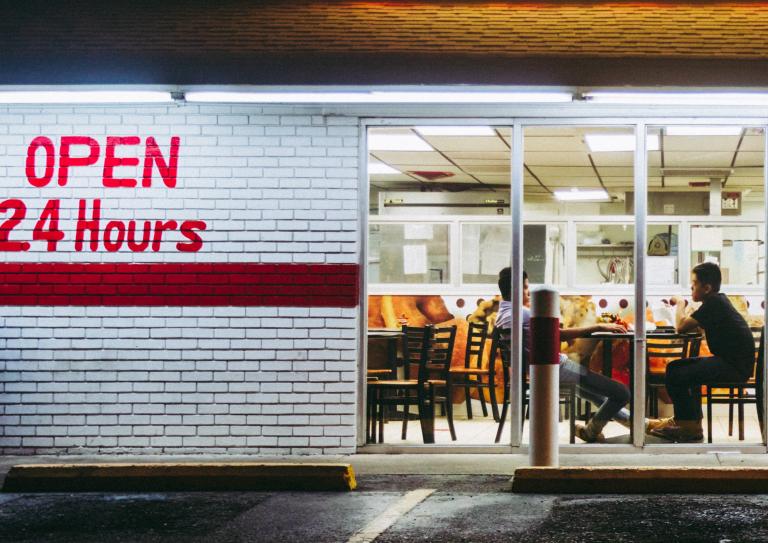The last quarter of 2018 was “the alternative reality” quarter of the year for Audrey and I. We found out in mid-October that a routine colonoscopy had turned up anything but a routine result. Audrey had cancer. November was filled with further tests and preparations for surgery. December was chewed up with major surgery and a minor follow-up one to deal with a complication from the first. Lots of hospital time.
So it was a massive relief that we were able to execute our New Years family vacation in the Florida Keys. Our three daughters, our new son-in-law, and my mom would all be there. We would all be away, together, safe and sound, relaxed.
Our trip was great, but it was not uneventful. The challenges we faced on vacation served to further my appreciation for the medical professionals whose vocation it is to care for people like us. Let me share what happened, consider this picture from the lens of work-life balance, and then draw some conclusions for our broader work.
No Escape from Reality
Our trip to the rental house in the Keys took a bit longer than planned. We flew into Miami and headed south. A long stop for lunch and then tons of weekend traffic slowed our progress down to a crawl. The delay was more than inconvenient. Audrey was not accustomed to being on the go for such a long period. When we finally got settled into our home for the week, she was tired and in pain.
As the days progressed, it became apparent that certain symptoms were not going away. Audrey called her primary care doctor. She left a message on the surgeon’s answering service. Both called back promptly, both called at night, both called during a holiday week. Audrey, and by proxy, all of us, experienced great relief through their attention and counsel.
Near the middle of our time away, another member of the family had an issue, and we had to race off to the emergency ward. Again, it’s evening, holiday week, and people were working in ways that brought us peace of mind. While these incidents may sound intense, they didn’t ruin our vacation. We were together. We were resting. And thanks to the work of medical professionals, we were safe.
Work-Life Not So Balanced
These experiences, in addition to several other calls with Audrey’s primary care doc, many on weekends and at night, got me thinking about work-life balance: the balance, or lack of it, experienced by our medical care team. The truth is, I was grateful for what I perceived as their lack of balance. It was such a relief to get answers and reassurance quickly.
It was a godsend to be able to have an “emergency” evaluated and deescalated within a 10-minute drive, with no need to head off hours away to a large city and truly disrupt vacation. And it has become intensely reassuring to know that we can get access to answers, instructions, and prescriptions 24/7 if necessary. Aches and pains take on terrifying proportions when you are fighting cancer. Those tremors of concern don’t wait till normal business hours. What a gift, what an extreme gift that a whole community of people makes it their business to provide specialized care around the clock.
I don’t know if they all work all the time. I know this is why they have group practices, so there can be coverage which translates into downtime. But it still amazes me how service-oriented they are and how much of a difference it makes to know they are available.
The great reformer Martin Luther said that God provides for us through the work of our neighbors. Sometimes this costs our neighbors. It can certainly be inconvenient. Yet when we are in need, great reassurance comes from their availability.
Work As a Sacrifice for Others
Like everything else, we are constantly monitoring our enjoyment of work. Many of us chose professions based on what we either enjoy or on what will benefit us most in terms of money, fulfillment, or intellectual stimulation. We don’t pick a career because we want to sacrifice our freedom and schedules to go above and beyond for others. Doctors and nurses pick their careers being willing to embrace those disruptions. They are part of the calling.
Here’s the question for you: How could sacrifice at work, take your level of engagement and impact to a whole new level?
- Who is a person among the stakeholders at your place of employment, for whom you could go out of your way? For whom you could be inconvenienced to show extraordinary customer care or team loyalty?
- Imagine the potential positive outcomes of this strategy as well as the potential costs.
- How does this relate to tendencies you might already have to overwork? How much of your overwork is driven by a desire to be there for people and how much is driven by something else?
Joy on the Other End of Sacrifice
If you are a Christian, you follow a leader and hero who won through sacrifice. Jesus gave up everything for the good of those in his service. He won by losing. He did not approach his work with a view of what would be immediately fulfilling. Instead, he took the long view. In a sense, he wasn’t completely selfless. The author of Hebrews says Jesus did this for the joy set before him—he knew it would be grandly worth it in the end.
Audrey’s team feels great joy when she’s doing well. They are deeply concerned and deeply grateful to see her looking healthy and strong (even in the midst of chemo). While they aren’t the only ones who are glad to see this, it’s different for them. They see her condition as in some sense their responsibility. They are on call to make her well.
How About You?
- Who might be relieved and find joy if you showed excellent attention and service to them?
- Whose progress or achievement would bring you great joy because it is, at least in part, from your attention, care or sacrificial investment in them?
The Christian ethic of sacrificial service has been demonstrated to us during Audrey’s illness even though many of these professionals are probably not Christian. We each can transform our work with the ethic of service and bring deep joy to our neighbors at work.
Dr. Chip Roper writes Marketplace Faith from New York City, where he is the Founder and President of the VOCA Center. Under Chip’s leadership, VOCA rescues clients like you from the forces that rob them of effectiveness and joy at work. VOCA provides coaching, training, and consulting to individuals and organizations in NYC and beyond. Visit our faith-based website at vocacenter.org and our market-facing menu of services at www.vocacenter.com.












